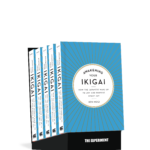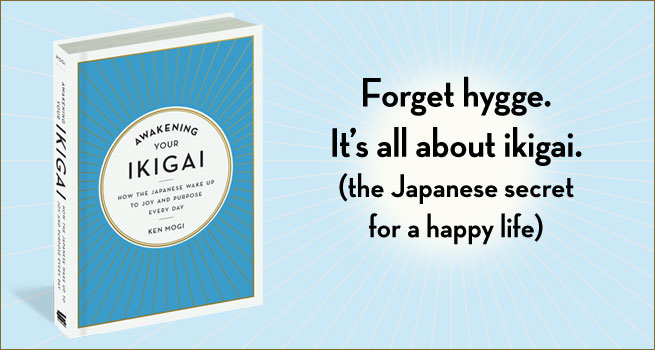Do you ever have trouble waking up in the morning? Do you continue to press the snooze button and wish for five more minutes under the covers? If this sounds like you, it may be time to explore the Japanese tradition of ikigai.
Recent years have seen an uptick in learning about and exploring different cultural traditions–the Buddhist practice of mindfulness; the Japanese life-changing magic of tidying up; Hygge, the Danish obsession with getting cozy–all have become wildly popular in the United States. The latest cultural tradition to make it across the world is ikigai, the Japanese phenomenon understood as “your reason to get up in the morning.”
Awakening Your Ikigai: How the Japanese Wake Up to Joy and Purpose Every Day, which is reviewed in an upcoming issue of The New York Times Book Review, who called it “a delightful look at sometimes mystifying Japanese traditions,” is written by Ken Mogi, a neuroscientist, writer, and broadcaster based in Tokyo. He has published more than 30 papers on cognitive and neurosciences, and over 100 books in Japan covering popular science, essay, criticism, and self-help. With Awakening Your Ikigai he uses insights from Japanese history, philosophy, and modern culture, plus stories from renowned sushi chef Jiro Ono, anime filmmaker Hayao Miyazaki, and others, to show how anyone can awaken his or her ikigai.
Ikigai relies on five pillars to help you make the most of each day and become your most authentic self:
1. starting small > focus on the details
2. releasing yourself > accept who you are
3. harmony and sustainability > rely on others
4. the joy of little things > appreciate sensory pleasure
5. being in the here and now > find your flow.
Ikigai can be many things: a cup of coffee or fresh morning air to a fulfilling job or lasting friendships. The important thing is to identify those things which give you ongoing motivation for life and an appetite for each new day. Identifying what brings you happiness is in itself important, but the benefits of ikigai go beyond that. In the excerpt below, Mogi identifies some of the ways that success and ikigai go hand in hand.
A self-administered questionnaire was distributed to 54,996 beneficiaries of the Ōsaki Public Health Center, a local government agency that provides health services to the residents of fourteen municipalities, aged between forty and seventy-nine years.
The survey consisted of a ninety-three-item questionnaire in which the subjects were asked about past medical and family histories, physical health status, drinking and smoking habits, job, marital status, education, and other health-related factors, including ikigai. The crucial question relating to the latter was very direct: “Do you have ikigai in your life?” The subjects were asked to choose one of three answers: “yes,” “uncertain,” or “no.”
Analyzing data from more than fifty thousand people, the Ōsaki study paper concluded that “as compared with those who found a sense of ikigai, those who did not were more likely to be unmarried, unemployed, have a lower educational level, have bad or poor self-rated health, have a high level of perceived mental stress, have severe or moderate bodily pain, have limitation of physical function and be less likely to walk.” Using just this study, it is of course not possible to tell whether having ikigai has led to improved marital, employment, or educational status of the subjects, or, alternatively, whether the accumulation of the various small successes in life has led to an increased sense of ikigai. But it would be reasonably safe to say that having a sense of ikigai points to a frame of mind whereby the subjects feel that they can build a happy and active life. Ikigai is, in a sense, a barometer that reflects a person’s outlook on life in an integrated and representative way.
 The benefits of finding your ikigai are multitude and Ken Mogi makes it easy to get started. He takes readers through ways of living, culture, tradition, mindsets, and philosophy of life in Japan and along the way he will help you discover: What are your most sentimental values? What are the small things that give you pleasure? In other words, he will help you awaken your ikigai.
The benefits of finding your ikigai are multitude and Ken Mogi makes it easy to get started. He takes readers through ways of living, culture, tradition, mindsets, and philosophy of life in Japan and along the way he will help you discover: What are your most sentimental values? What are the small things that give you pleasure? In other words, he will help you awaken your ikigai.
For more information, check out Awakening Your Ikigai by Ken Mogi, available now wherever books are sold.



